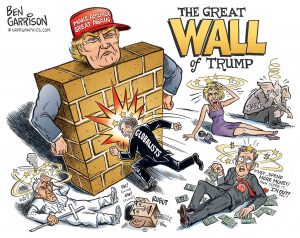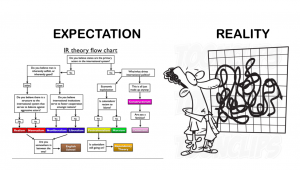Make America Great Again has been popularized by President Donald Trump. But what is not great about America? The USA has been dominating the international market after the second world war. They took the role of international leadership and have one of the most powerful military. Even when non-believers think their power is declining, they are still leading the world with international institutions at their reach. Again, what is not great about America?

In Robert O. Keohane’s essay, Hegemony and After, he argued that global leadership is strengthened by multilateral institutions. His key assumptions include:
- hegemonic state promotes international cooperation in solving collective problems
- multilateral institutions enable states to cooperate and communicate with one another
- sharing responsibilities with the leading state increases stability
- political involvement of citizens in a democratic state is crucial especially with a hegemonic state such as the US
- democracies are more stable than autocracies
- only the US has the capabilities and willingness to exercise global leadership
While the US indeed leads international politics, I would argue that collective problems are defined and influenced by the hegemonic state and the hegemonic state’s democracy affects and is affected by international politics.
The US has great influenced through different mediums. They have control over the internet, entertainment, and news. This means that what we see and what we focus on is determined by what America thinks is relevant. For example, without fully knowing the narrative, Kavanaugh’s name has been all over the internet, from Facebook to Twitter.
US politics and their problems become universalized. Keohane claimed that leadership is necessary to solve global problems yet these problems are defined by the US or the hegemonic state. If the US believes that global warming isn’t real, solving this collective problem would be impossible since the leader itself does not believe that global warming is an important issue. Even when the rest of the world is cooperating, it would be more difficult since multilateral institutions that create and foster agreements are inevitably influenced by America.
During the 2016 US Presidential Elections, the whole world was waiting for the results. This is because whoever Americans elect affects international politics. Americans are not just deciding for their leader but for the leader of the world. The recent trade war between Canada and America has demonstrated this. Tariffs imposed by the Trump administration would affect Canadians and Americans alike.
The burden of voting for the leader of the world influences America’s democracy as well since as we saw from the last presidential election, it was intervened by Russia for its political interests. America’s democracy is unavoidably affected by international politics. Presidential campaigns were filled with advocacy of policies regarding international issues such as immigration and the refugee crises.
While having a hegemonic state has significantly decreased international competition, solving collective problems did not necessarily become as easy as Keohane suggested. At its best America’s interests benefits everyone. At its worst, collective problems are ignored for the benefit of American elites.

